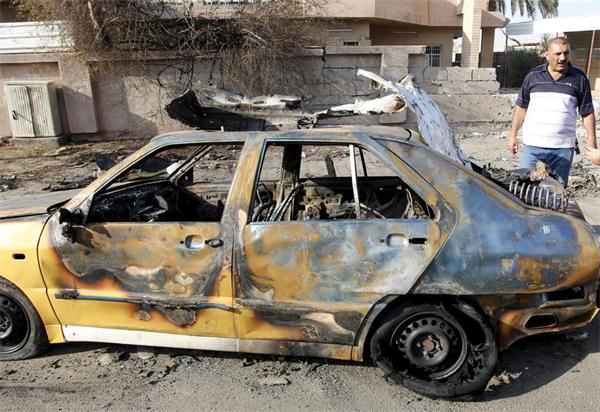 |
|
A destroyed vehicle is seen at the site of car bomb attack in Baghdad July 13, 2015. Car bombs and suicide attacks targeting mainly Shi'ite Muslim districts of Baghdad killed 35 people on Sunday, one of the heaviest recent tolls in the Iraqi capital, which has faced a wave of bombings by Islamic State militants. [Photo/Agencies] |
One year has passed since the Islamic State began wreaking havoc in the Middle East, particularly in Iraq and Syria. The rapid expansion of the terrorist group in the region has not only darkened the prospects of international efforts to fight terrorism, but also laid bare the failure of the Middle East policy of the United States.
Air strikes by the international anti-terror coalition, led by the US, have failed to halt the march of the extremist group. Instead, the group has built one stronghold after another and seized a combined territory of 80,000-90,000 square kilometers.
The group now dictates the future of about 6 million people in its strongholds and has infiltrated more than 20 other terrorist groups around the world. It has set up training camps to instill jihadist ideology into youths and imposed its own laws on the people in its sphere of influence.
The world apparently lacks experience in dealing with such a well-organized terrorist group. The magnitude of its brutality and wild ambition go beyond imagination. The only way the world can end its influence is to defeat it through international cooperation in which all forces willing to fight the IS group can be united.
Yet the incidents of the past year show building such an anti-terrorism coalition is not possible, mainly because the US applies different anti-IS strategies in Iraq and Syria to fulfill its own interests: In Iraq it actively supports government forces to combat IS extremists while in Syria it continues to aid anti-government forces ignoring the fact that after years of civil war Syrian government troops are the only force left that can take on the IS in the country.
Last week, US President Barack Obama said the only way Syria's civil war can end to unite the country against the IS group is through a government without Syrian President Bashar al-Assad. This shows ousting Assad is still more important for the US than ending the IS menace.
The fact that the US leaders and Assad are fighting a common enemy has failed to prompt Washington to change its hard-line policy toward Syria. The US' obstinacy can only lead to serious consequences, for its approach will never help unite all the anti-terrorism forces against the IS. By putting its own political agenda above the international campaign against the IS, the sole superpower cannot help inflict a fatal blow to the IS.
The US' double standards have already made many suspicious about its intentions, that in reality it wants to drive the IS terrorists out of Iraq and into Syria so that they can weaken the Syrian government troops, which will ultimately help Washington topple Assad. This self-serving stance will set the worst example possible in the region, because countries like Iraq and Syria have already become battlegrounds of different political forces.
Some countries in the region, despite being supporters of the anti-IS campaign, may also have their own calculations: They would rather allow the IS group to weaken their opponents in the region than see their opponents become stronger in the fight against IS.
Such trends cannot be allowed to continue if the IS is to be eliminated, and the US has both the international responsibility and moral obligation to change its approach and make real contributions to the anti-terrorism war.
If the deadly march of IS extremists goes unchecked, it will threaten the security and stability of not only the Middle East but also the rest of the whole. Therefore, the US should discard its existing Middle East policy and make real efforts to clean up the big mess in the region, because it created it in the first place.
The author is a senior writer with China Daily. wanghui@chinadaily.com.cn